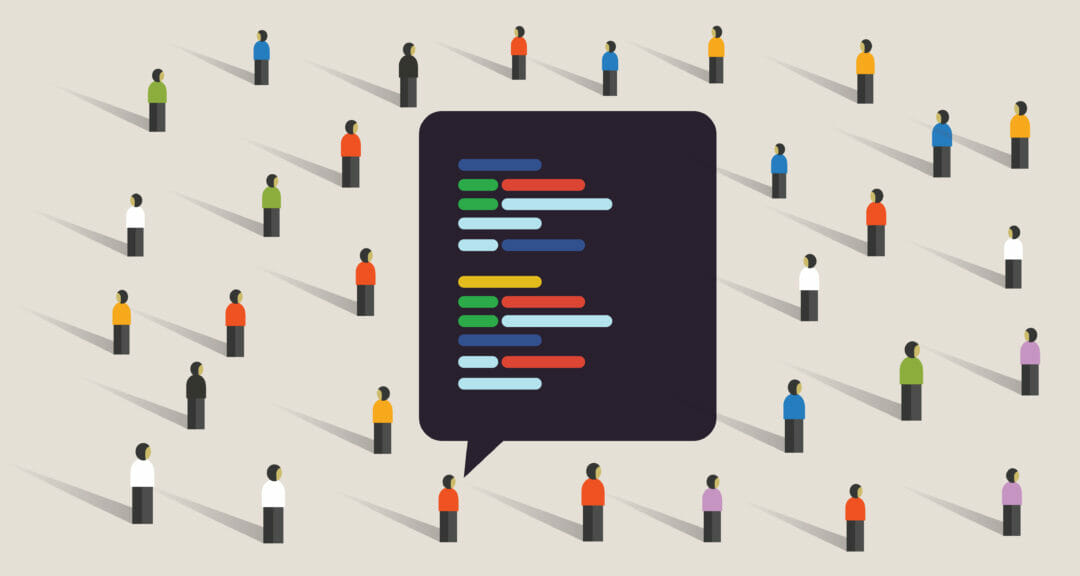What are your first impressions when you hear the words “open source?”
I associate them with community, providing open access to code, and making it easier for people to achieve their goals. But, there are also underlying issues around how we develop software and interact with each other, particularly when it comes to managing contributions and meeting the community’s overall needs.
At the heart of open source is the drive to ensure everyone has the tools they need to succeed. This should also include expanding the community and helping more individuals get what they need from open source, whether this is using projects, adding contributions, or for personal fulfilment.
However, are we doing a good enough job of considering the future of open source communities? How do we support the next generation entering into open source, and about how should we encourage more diversity in the community?
We conducted research into open source attitudes to diversity and inclusion (D&I), as part of a wider survey into licensing changes and the cloud. The results were interesting and show a desire to support D&I in open source:
● 67% of respondents listed thought the open source community should support and encourage diversity through additional mentoring.
● The second most popular choice was investing and promoting educational material (65%), followed by promoting safe spaces and special interest groups (57%) and improving retention (56%)
● Lower down the list was supporting more recruitment from minority and disadvantaged groups (52%)
These are all great options when it comes to helping communities develop their memberships and support diversity. However, looking at the ranking of the options shows more focus on existing community members than finding and welcoming new talent. Although mentoring and educational materials are valuable for existing members of the community, there is definitely more work to be done on attracting and retaining people over time.
While the responses were positive, how can we get more people involved in the community as a whole? How can we throw the doors open, and make people comfortable enough to utilise those tools and resources we have in place?
There is no single action that can make a difference. Instead, many related choices can improve the community as a whole and make open source more open for individuals less familiar with it. For contributors, supporting new people joining the world of open source should be something we all take seriously, as it often takes just one person to make another feel welcome. It also means acknowledging how lucky we are to be a part of the community and to contribute to it. Finding more potential candidates benefits everyone – newcomers, established contributors, and the community as a whole.
Nominations are now open for the 2022 Women in IT Awards – one of the largest technology diversity awards programme in the world
Over the last 18 months, we’ve seen some incredible dedication, transformations, and innovation from professionals and organisations alike – especially in the tech sector. And our 2022 Awards, now in its eighth year, aims to highlight the growth, continuity and results of these incredible women, allies, and organisations.
View the categories and nominate yourself or a colleague/peer who deserves to be recognised and celebrated.
For companies that directly support open source communities – whether this is for a specific project or for multiple ones – making it easy and attractive to join in and participate should be a priority. This can also involve creating more educational material, but this should be pitched at those people not yet in the community, as well as the old-hands. This might involve introducing more training so students can learn about open source projects alongside their formal courses, or even look at early years education so young people become familiar with the ethos of open source while still at school. These activities will help more people feel that they can join in, and that their contributions will be valued.
Companies that indirectly support open source and monetize these projects – I tend to mean the big public cloud providers like AWS here – have a big opportunity to make a difference for the community as a whole in terms of specific D&I support, and general sustainability. Our research found that the most popular areas for public cloud providers to contribute back to open source was by providing better security (59%), by encouraging open source collaboration (48%), and by improving existing code quality (43%).
Alongside this, financial support for project contributors and maintainers would also not go amiss. Public cloud providers can easily take open source projects and provide these ‘as a service’ to customers.
This can then suck the majority of the potential revenue out of the market. This approach deprives open source organisations of funds that would ordinarily be invested into those projects via contributions and development support.
This siphoning-off of potential revenue limits the ability of independent contributors or smaller vendors to get involved, as they can’t rely on service revenues to support themselves. It’s hard for people to participate when they have to do something else to pay the bills, and it restricts participation to only those who have corporate support.
D&I is a complex subject, and there are many ways that people can get involved to encourage and support new people joining the community. We want as many people as possible to get involved. While we currently have a strong approach to helping people stay in the community, we can always do a better job of lowering the barriers to entry.








